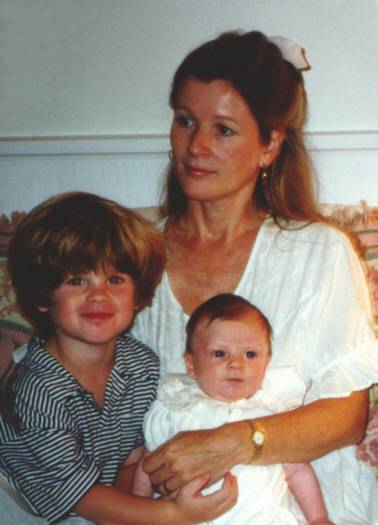By Joe Guzzardi
02/22/2002
Maggy Brimelow with Alexander and Hannah Claire, months before breast cancer was diagnosed in 1996

Long ago, my family packed up to move from Los Angeles to Guatemala.
My father had a middle-management job with a large multinational firm. His first move for the company took our family to Puerto Rico. His second assignment was in Guatemala.
By the time we moved, I had started college. I visited during summer and Christmas vacations but after I graduated, I headed for New York.
My two younger sisters, on the other hand, went to school in Guatemala. Neither ever returned. They chose instead to marry Guatemalans and begin families of their own in their newly adopted country.
Over the years, I have visited Guatemala. And my sisters have come to California. But on the whole, we would have seen more of each other had we lived closer.
Recently, I have had more than the usual reasons to regret not being closer to my sisters, nieces and nephews.
In one of life’s cruel twists, both my sisters have breast cancer. At a time when I want to do the most that I can, geography gets in the way.
Is there a scarier word in the English language than "cancer"?
Although the answer to the question is no, people have more reason for optimism than ever before.
Over the last decade, enormous strides have been made in cancer research. In 1946, only 25% of cancer patients lived longer than 5 years after diagnosis; today, almost 60% live longer than five years.
And for the first time in human history, cancer death rates have steadily, if modestly, declined.
During 2002 about 200,000 women and 1,500 men will be diagnosed with breast cancer. That is double the case rate from two decades ago.
On the surface, that’s not good news. But in truth many of those cases are early detections that result from improvements in mammography.
Because of better technology, cancers as small as a pinhead show up in routine mammograms. Mammograms can detect tumors as small as 0.5 cm as opposed to tumors found by self-examination that are around 2.5 cm.
These tiny malignancies are often easily treated.
Despite improvements in mammography, a long-standing debate about its value continues. Some European scientists and academics are convinced that they don’t save lives. But the American doctors and the American Cancer Society (www.cancer.org) strongly urge women to have regular mammograms.
No other screening test for breast cancer is as effective as a mammogram. Even though mammograms may miss 10% of breast cancers, it is more effective than any other screening test.
When a mammogram detects a tumor in an early stage of development, a woman will have more treatment options. With early detection, a woman might be able to avoid chemotherapy.
And research continues. Doctors at the University of Texas in Houston and the Weill Cornell Center have developed a method of killing tumors inside the breast by using high-frequency radio waves guided by ultrasound.
Hopes are high that this new method, if successfully tested, will eliminate surgery altogether.
Over these next two weeks the ACS offers you the opportunity to give the gift of hope through its annual Daffodil Days message. By participating, you can help the American Cancer Society raise millions of dollars to continue the fight against cancer.
From now through March 7th, a purchase of daffodils will not only light up a room and bring a smile, it will make a difference to thousands who are coping with cancer.
Here is what your donation will do:
For more information about how you can contribute, please call the American Cancer Society at 800-ACS-2345 (800-227-2345) or go to the ACS website at https://www.cancer.org/.
Joe Guzzardi, an instructor in English at the Lodi Adult School, has been writing a weekly column since 1988. It currently appears in the Lodi News-Sentinel.
This is a content archive of VDARE.com, which Letitia James forced off of the Internet using lawfare.